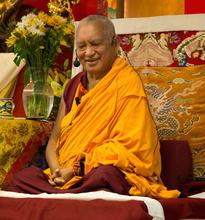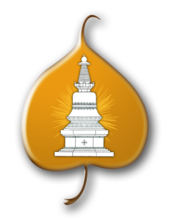Lama Zopa Rinpoche Teaches on The Seven Point Mind Training


Don't miss this rare and precious opportunity - a one-day visit from our Teacher and Spiritual Director Kyabje Lama Zopa Rinpoche. On his way to our Light of the Path Retreat, Rinpoche agreed to spend the day at Kadampa Center to teach the fundamental text Seven Point Mind Training.
Known for his unpredictable teaching style, Lama Zopa Rinpoche often will change the subject to better suit the needs of the students. As an FPMT center we place all our vision, practices, and programs under his guidance. Just meeting Rinpoche is extremely special, much less directly hearing his unique humor, insight, and compassion!
In addition to offering a teaching, Rinpoche has granted us the rare opportunity to celebrate a Guru Puja with him. By joining in this puja with Rinpoche, we create the cause to meet him again in future lives. Our prayers also create the cause for him to remain in this life even longer – how wonderful! There will be ordained sangha from around the world participating in the puja, so don’t miss it!
Lama Yeshe on Guru Puja and Tsog:
Tsog means gathering. We gather together the things we’re offering, and we ourselves gather together to do the practice. Gathering together with other practitioners, concentrating our minds into the same space, gives us great inspiration. It’s much better than just doing puja alone in our own rooms. This is the Tibetan connotation of tsog.
Tsog in the Tibetan tradition is a most profound method of purification, a profound way of gaining realizationns. When you recite the text in English you can see how many subjects are included in the practice.
The Guru Puja, for example, covers the entire path to enlightenment from beginning to end. So it can happen that in your daily meditations on the lamrim you’re not making any obvious progress, then suddenly during a puja, because of the conducive atmosphere you’ve created, zoom! — some realization comes into your mind. Many people have gained realizations during a puja simply because of the atmosphere.
Another connotation of tsog is ‘party’ — a party at which we share simultaneously born great wisdom and bliss. Now that’s a party.
Click here for more information about Guru Puja.
The schedule:
We advise arriving at least 15 minutes in advance. We will greet Rinpoche with katas in the parking lot when he arrives.
11 am Teaching on Seven Point Thought Transformation
1 pm Lunch break (light snacks offered)
3 pm Guru Puja with Tsog
Students are encouraged to bring katas (or buy one in the bookstore – best to get one in advance if you can!) and line up to welcome Rinpoche as he arrives, and there will be an opportunity to present offerings at the end of the day. The teachings will be transcribed live during the event in case anyone has difficulty understanding his English with an accent. Copies of the text will be handed out at the event.
Sponsors
You can help make this visit possible -- see below for information about sponsoring Rinpoche's visit!
Volunteers
You can also help by volunteering! A meeting for volunteers will be held on Sunday, July 31 after the Sunday teaching. Also, join us on August 6 for an outdoor work day or drop by on Friday August 12 to help inside the Center. There will also be a lot happening at the center the week before the visit. For questions please contact program.donna@kadampa-center.org.
A Short Biography
(From Lama Yeshe Wisdom Archive)
Rinpoche was born in Thami, Nepal, in 1946. At the age of three he was recognized as the reincarnation of Sherpa Nyingma yogi, Kunsang Yeshe, the Lawudo Lama. Rinpoche’s Thami home was not far from the Lawudo cave, in the Mount Everest region of Nepal, where his predecessor meditated for the last twenty years of his life. Rinpoche’s own description of his early years may be found in his book, The Door to Satisfaction (Wisdom Publications). At the age of ten, Rinpoche went to Tibet and studied and meditated at Domo Geshe Rinpoche’s monastery near Pagri, until the Chinese occupation of Tibet in 1959 forced him to forsake Tibet for the safety of Bhutan.
Rinpoche then went to the Tibetan refugee camp at Buxa Duar, West Bengal, India, where he met Lama Yeshe, who became his closest teacher. The Lamas went to Nepal in 1967, and over the next few years built Kopan and Lawudo Monasteries. In 1971 Lama Zopa Rinpoche gave the first of his famous annual lam-rim retreat courses, which continue at Kopan to this day.
In 1974, with Lama Yeshe, Rinpoche began traveling the world to teach and establish centers of Dharma. When Lama Yeshe passed away in 1984, Rinpoche took over as spiritual director of the Foundation for the Preservation of the Mahayana Tradition (FPMT), which has continued to flourish under his peerless leadership. More details of Rinpoche’s life and work may be found on the FPMT Web site.
Teachings by Rinpoche
Thousands of pages of Rinpoche's teachings have been made available as transcripts, books and audio by the Lama Yeshe Wisdom Archive, and most are freely available on the Archive's website. Rinpoche’s other published teachings include Wisdom Energy (with Lama Yeshe), Transforming Problems, Dear Lama Zopa and and many prayer and practice booklets available in Kadampa Center's bookstore.
Sponsorship Opportunities
Kadampa Center has a tradition of offering these precious teachings solely on a donation basis so that money is never an obstacle to hearing the Dharma. In order to support the hosting of visiting teachers without ticket fees, we offer various sponsorship opportunities. Each sponsor can elect to prepare a personal dedication to be read aloud and posted at the center during the teacher's visit, and will have reserved seating. Part of the money received is offered to the teacher at the end of the event on behalf of the entire center community.
Any of the options may have multiple sponsors. Choose from one of the options in the drop-down below, and you will be taken through our online process. Or, you may email centermanager@kadampa-center.org to offer your precious sponsorship!
Special note to our precious sponsors: Our center manager and office admin will be out of town setting up for the retreat, so if you wish to include a dedication for your sponsorship, please submit it by noon, Thursday, August 11. You can still create the incredible merit of giving the Dharma through sponsorships after that time, but we won’t be able to include your dedication.
Donations
Donations of any amount are greatly appreciated. You may place cash or check in one of our conveniently located donation boxes. If you would like to give by credit card, click here.
Sponsor Rinpoche's visit here

